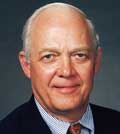by James A. Bacon
Nearly 40 years ago I moved from the big city to a place had I barely heard of, Martinsville, Va., to embark upon my journalism career as a cub reporter for the Martinsville Bulletin. Compared to Washington, D.C., where I had spent most of my time growing up, it seemed a hard-scrabble place. Little did I know, those were the glory days.
Martinsville was reputed to have more millionaires per capita than anywhere else in Virginia. (Those were the days before the rise of Northern Virginia’s high-tech industry sector.) There was poverty, to be sure, but the region had pride. As the headquarters town for three major textile and apparel companies, Martinsville claimed to be the Sweatshirt Capital of the World. In the days before off-shoring, the town dominated the global knitted fabrics sector. Martinsville and nearby communities of Bassett and Stanleytown also comprised one of the largest concentrations of furniture manufacturing in the country. There was a large DuPont plant there as well, and even a high-tech company started by immigrant Julius Hermes, Martin Processing, that manufactured advanced film coatings.
Other than DuPont, all the businesses were locally owned and operated. Martinsville was no branch-plant economy. The town had a strong middle class of middle managers and professionals. And even the poor weren’t destitute. Many workers lived on plots of land in the country, supplementing their factory wages with garden crops and, often, small plots of tobacco. To my recollection, the population was affluent enough to support four country clubs. The local delegate to the General Assembly, A.L. Philpott, was speaker of the House. Martinsville was small but it punched above its weight.
In just a few short decades, however, it all came tumbling down. America embraced globalization and open trade. It was something the nation had to do, and there has been a huge payoff to companies and their employees who could provide the higher value-added services where American was globally competitive. But free trade came at a cost — and the people of Martinsville were among those who paid it. First the DuPont nylon plant closed, for reasons that may or may not have been connected to free trade (I can’t remember). The textile-apparel sector was the next to go. Within a couple of decades after I had left, the entire sector had shut down, shuttering the huge knitting mills, as production moved to Asia. Then the furniture industry met its demise. That process was more protracted, and some of the companies survived. Although most production moved overseas, local companies like Bassett, Stanleytown and Hooker survived as furniture designers, marketers and distributors of Chinese-manufactured goods.
That’s all prelude to the purpose of this post, which is to highlight a new book, “Factory Man,” by Roanoke Times reporter Beth Macy, which received a rave book review in the New York Times. Macy tells the story of John Bassett III, president of Vaughn-Bassett Furniture, who fought the fight to preserve furniture manufacturing in Virginia and North Carolina longer and harder than anyone. As the NY Times recapitulates the story:
[Macy] went looking for mountain families who had spent generations working for the region’s furniture giants, until the whole industry was walloped by cheaper furniture imported from China. She found all that and more in the battling Bassetts, a feudal family of factory owners who controlled a string of these companies and the bank, hospital, school, clinic and housing their workers used.
Questions of how the business can survive weigh heavily on manufacturers’ minds.
The ’80s answer brings JBIII’s attitude into stark contrast with those of his fellow owners. Companies merge; Wall Street takes over; laying off workers and closing plants is seen as smart rather than damaging. And nobody much cares what happens to those workers except for JBIII, who can’t bear thinking of them “in unemployment lines instead of assembly lines.”
After leaving the Martinsville Bulletin, I worked for the Roanoke Times from 1979 to 1984. That was before Macy joined the newspaper. I did not know her, but my hat’s off to her for finding the color and the drama in Bassett’s largely Quixotic quest and for telling a story that truly deserves to be told. John Bassett will never be remembered as one of America’s great innovators, like Steve Jobs, or one of its captains of industry, like Jack Welch. Unlike them, he failed. He could not revitalize American furniture manufacturing; China’s economic advantage of cheap labor was overwhelmingly decisive. But he deserves America’s admiration as a businessman who cared about the people who depended upon him, who chose to follow the hard path rather than the easy one, and who gave it his all.
(Hat tip: Patrick Zilliacus)



